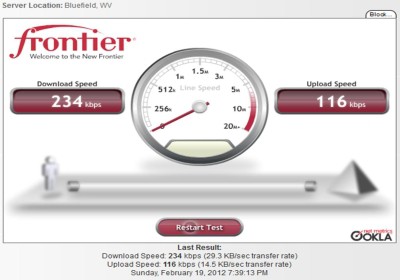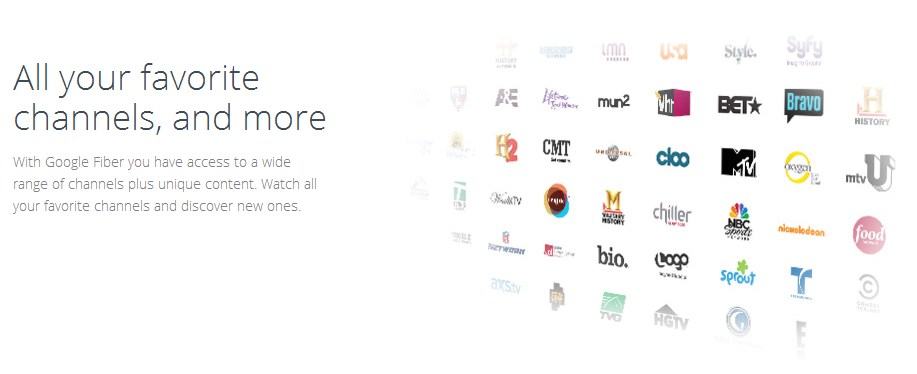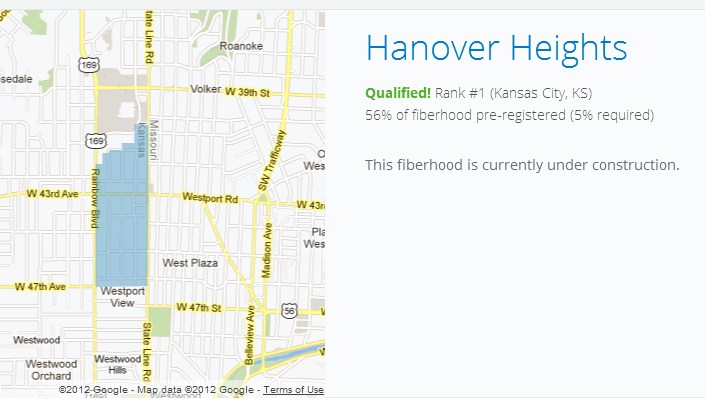A very frustrated employee of Frontier Communications working in one of their Ohio offices sent Stop the Cap! a detailed report on some of Frontier’s problems with customer service, unfair fees, and other horror stories. In this final part, a look at Frontier’s broadband service and how the company is still struggling to integrate ex-Verizon customers now a part of the Frontier family. “It is as if Dollar Tree bought out Wal-Mart.”
Frontier recently began marketing faster Internet speeds to many of their customers who can finally sign up for something roughly equivalent to today’s standard speeds from cable operators. But even in its more advanced forms of bonded DSL, ADSL2+, and VDSL, all remain distance-sensitive. Customers may simply never get the speeds they were promised if they live too far from the phone company’s central office.

Frontier wants to see the end of speed test results like this.
We recently started pushing our premium speed broadband to customers who qualify for our new speeds, which run up to 25Mbps for residential customers. Customers who truly qualify for this service will actually get to receive decent speeds comparable to what Time Warner Cable and Comcast offers.
We were originally planning to market this as competitive with FiOS fiber optic speed, but I’m honestly not surprised they dropped that angle once they thought of how stupid it would sound to veteran DSL customers that a standard telephone line could reach those speeds. Even the majority of our Frontier FiOS customers are sometimes lucky to receive the speeds that cable offers, but for different reasons.
If a representative says you do qualify for faster Internet service, it is still an absolute crap-shoot whether or not you will actually get through a two-hour streamed Netflix movie in two hours instead of four thanks to buffering issues.
We are still in the early stages of rolling out these new speeds and there are still many issues in our internal systems to work out. For example, if our internal Salesforce/DPI system has not been updated, you are not going to get the faster speed service even if you can see the central office from your house. When it does show a customer is qualified, both the customer and I rejoice because I get a commission and the customer can now successfully access Facebook in less than three hours. Unfortunately, we don’t live in a perfect world and three of my orders for premium broadband Internet failed to complete despite the fact our system said they were qualified.
The cryptic reason? “Technology restraints do not allow this customer to reach any higher speeds.” That comes courtesy of our techs, who use it as a catch-all to cancel orders. Nobody can tell me why. I’ve asked dispatch, assignment, and tech managers and they have given me different explanations — none that seemed valid.
That leaves me calling back the customer, now excited they can finally use our broadband service to play online video games or Skype their son in college without being disconnected and let them know I was a big fat liar when I promised them something better, only to leave them stuck with what they had.
Next we need to update the information in those customers’ profiles so future reps do not lead them on. I have rechecked those accounts and to this day none of that information was updated. I just see my cancelled orders. So, there is even misinformation taking place within the company, preventing us from providing a risk free service.

Modem fees are a nuisance to a number of Frontier customers. The company is eliminating them for some customers.
Modem fees no longer apply to many Frontier broadband plans
Modem fees used to be an issue, however they are now increasingly included in the price of your broadband service. This can be especially good news in a competitive market where your broadband bill drops by nearly $7 a month, but those already using their own equipment will no longer see any savings from service credits applied to their monthly bills.
Are you really getting Frontier FiOS broadband speeds? Maybe not.
Speaking about misinformation, we have several Frontier FiOS customers that are actually only getting basic cable or DSL Internet speeds because their house was never actually wired with fiber. A street may have fiber optic cables all around, but if a customer is still using copper cable from the pole and inside their home, they are paying for services they are not getting. These customers are often noted in customer records we can access, but we are discouraged from sharing that information. This is not entirely our fault. This was a problem left over from the previous owner, Verizon Communications, which left us the mess to clean up. If you are only receiving half of the FiOS speed you are paying for, this may be why. If you complain, we will issue credit or create what we call a “SIFT Ticket” to send a tech to investigate a possible service upgrade.
Playing the Telephone Game with the telephone company
There have been countless times when I’ve been told five different things by five different people about how to handle a customer calling in for assistance. I understand that with millions of customers it is hard to predict what will happen on that next call, but simple things such as a consistent way to handle customer requests should be standard stuff. So, what can I do? Pick one of the five options and hope it is the right one for the customer.
 Working for Frontier means dealing with short term goals that vary wildly day to day with no focus on any sort of objective. These loose operations and inconsistencies come straight from the top. This affects our long term goals as a company (whatever the hell those might be). These endlessly varying short term goals leave us with no foundation for long term goals because… again, there is no focus. That needed to be said twice.
Working for Frontier means dealing with short term goals that vary wildly day to day with no focus on any sort of objective. These loose operations and inconsistencies come straight from the top. This affects our long term goals as a company (whatever the hell those might be). These endlessly varying short term goals leave us with no foundation for long term goals because… again, there is no focus. That needed to be said twice.
Customers notice the rampant inconsistencies. A lot of customers candidly tell me, “you guys are spread too thin, and there is a severe lack of communication between all of your call centers.”
This is true, and much of it has to do with our purchase of former Verizon landline customers. It is as if Dollar Tree bought out Wal-Mart. I feel like we have bit off more than we can chew, despite the fact management dismissed these concerns as “speed bumps from the conversion.”
It is now 2012 and 2013 is coming closer every day and I am still dealing with the same issues that should no longer be happening as often as they should.
So, in closing, this has been my rant about the company I work for. I do enjoy my job (honestly, I do) and the people I work with are great. Even the customers who scream and yell at me, or the ones who commend me for my work, they’re all great in their own way. Nothing is as satisfying as actually calming someone down who has an issue with their bill, only to have them apologize and be grateful they got me on the phone. You have to truly be a people person to do this job, and not just do it for the money or it won’t work out for you. I’m not the most perfect representative, but I hope to strive to truly make every day I’m there in my cube less and less miserable and tedious.
Hopefully this crap can eventually be flushed and one day soon Frontier’s wheels will run smoothly.
 Google recognizes that television lineups still matter. The Kansas City gigabit fiber broadband project is not just about faster Internet access, and some KCMO and KCK residents have made it clear if Google Fiber lacks the television channels they want to see, they won’t switch providers.
Google recognizes that television lineups still matter. The Kansas City gigabit fiber broadband project is not just about faster Internet access, and some KCMO and KCK residents have made it clear if Google Fiber lacks the television channels they want to see, they won’t switch providers. On Monday, Google landed a deal with News Corp., parent company of Fox, for a bunch of additional sports, news, and general entertainment channels. The latest additions: BabyTV, Big Ten Network, Fox Business Network, Fox College Sports Atlantic, Fox College Sports Central, Fox College Sports Pacific, Fox Deportes, Fox Movie Channel, Fox News Channel, Fox Soccer, Fox Soccer Plus, FS Kansas City, Fuel TV, Speed and FX. Other additions also announced: HSN2, KPXE-TV DT2 – Qubo, KPXE-TV DT3 – ION Life, Nat Geo Mundo, Nat Geo WILD, National Geographic Channel, and Utilisima,
On Monday, Google landed a deal with News Corp., parent company of Fox, for a bunch of additional sports, news, and general entertainment channels. The latest additions: BabyTV, Big Ten Network, Fox Business Network, Fox College Sports Atlantic, Fox College Sports Central, Fox College Sports Pacific, Fox Deportes, Fox Movie Channel, Fox News Channel, Fox Soccer, Fox Soccer Plus, FS Kansas City, Fuel TV, Speed and FX. Other additions also announced: HSN2, KPXE-TV DT2 – Qubo, KPXE-TV DT3 – ION Life, Nat Geo Mundo, Nat Geo WILD, National Geographic Channel, and Utilisima,

 Subscribe
Subscribe







